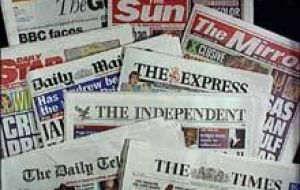MercoPress. South Atlantic News Agency
Leading case: EU Court ruling supports non disclosure of press sources
 The case involved UK’s main newspapers and Reuters and Belgian brewers
The case involved UK’s main newspapers and Reuters and Belgian brewers Judges at the European Court of Human Rights said that four British newspapers and a news agency were right to defy a court order to disclose documents that would have identified the source of a story about a multimillion pound City takeover in 2001.
By standing their ground the four newspapers and one news agency faced massive under British law fines and seizure of their assets, while the journalists who wrote the stories could have been jailed.
But judges in Strasbourg said that the refusal was justified under the right to free speech. They also awarded all five companies £144,000 in legal costs compensation.
The case concerned a High Court ruling, upheld by the Court of Appeal, ordering The Independent, Financial Times, The Guardian, The Times and Reuters to hand over to Belgian brewing company Interbrew leaked documents disclosing its possible bid for South African Breweries. On 29 November 2001 The Independent published two articles about the leaked documents, one of which stated that the offer price and timetable for the Interbrew deal appeared bogus.
On the same day Interbrew, in agreement with the Takeover Panel, published a statement to the press alleging that the leaked document contained fabrications. This statement was reported by all five organizations, and as a result of the coverage there was a significant impact on the market in shares of Interbrew and South African Breweries.
In 2002 Interbrew dropped its case against the organizations and, in 2004, the Financial Services Authority, the City regulator, also abandoned its own investigation after admitting to difficulties unearthing the source of the leak. But to overturn the UK order The Independent had to take its case to the ECHR where the UK Government was forced to defend the judicial decision to grant the order.
Lawyers for The Independent argued that disclosure would damage the freedom of expression of the press in a democracy, saying that there was no difference between an order for disclosure of a source's identity and an order for disclosure of documents that might identify a source. In its defense the British Government argued that the right to freedom of expression did not require the protection of sources in all circumstances, but the judges of the ECHR disagreed, saying that “a chilling effect will arise wherever journalists are seen to assist in the identification of anonymous sources”.
The ECHR also found that Interbrew's argument that it wanted to prevent further damage by identifying the source of the information was “insufficient to outweigh the public interest in the protection of journalists' sources”.




Top Comments
Disclaimer & comment rulesCommenting for this story is now closed.
If you have a Facebook account, become a fan and comment on our Facebook Page!